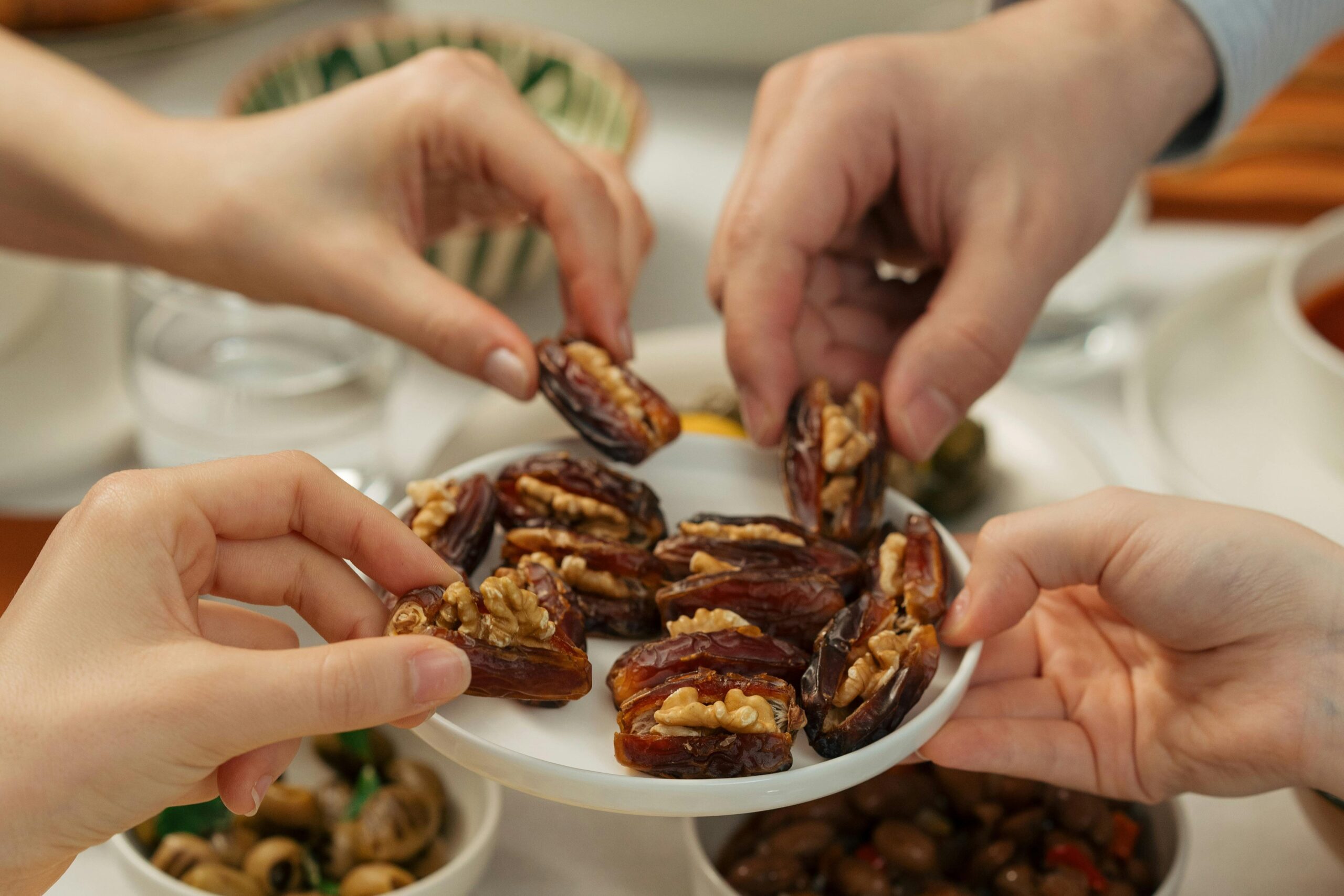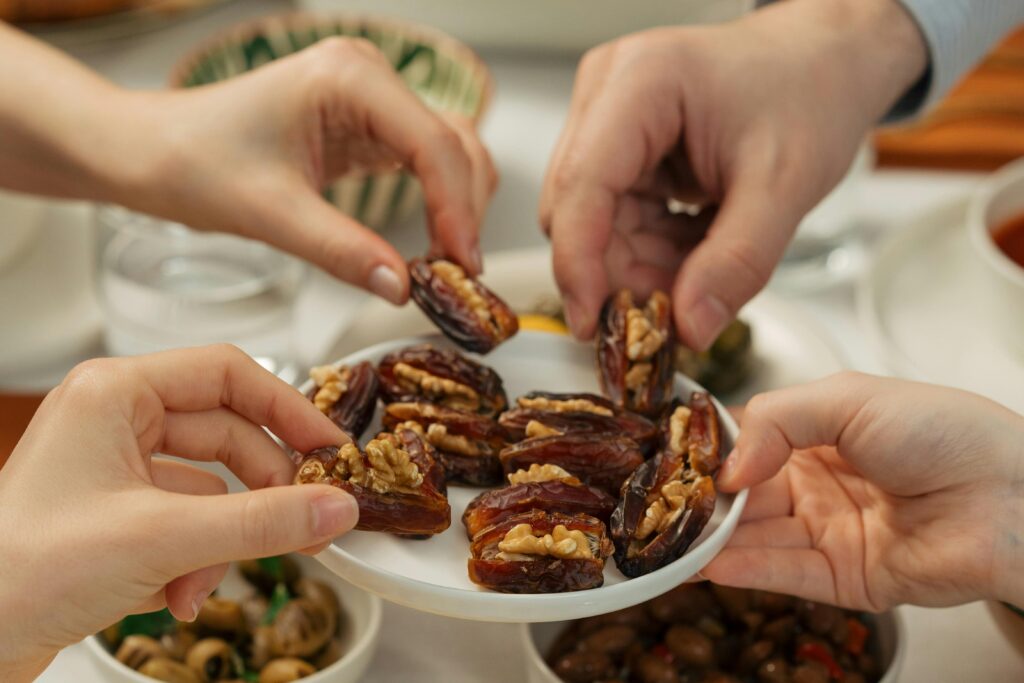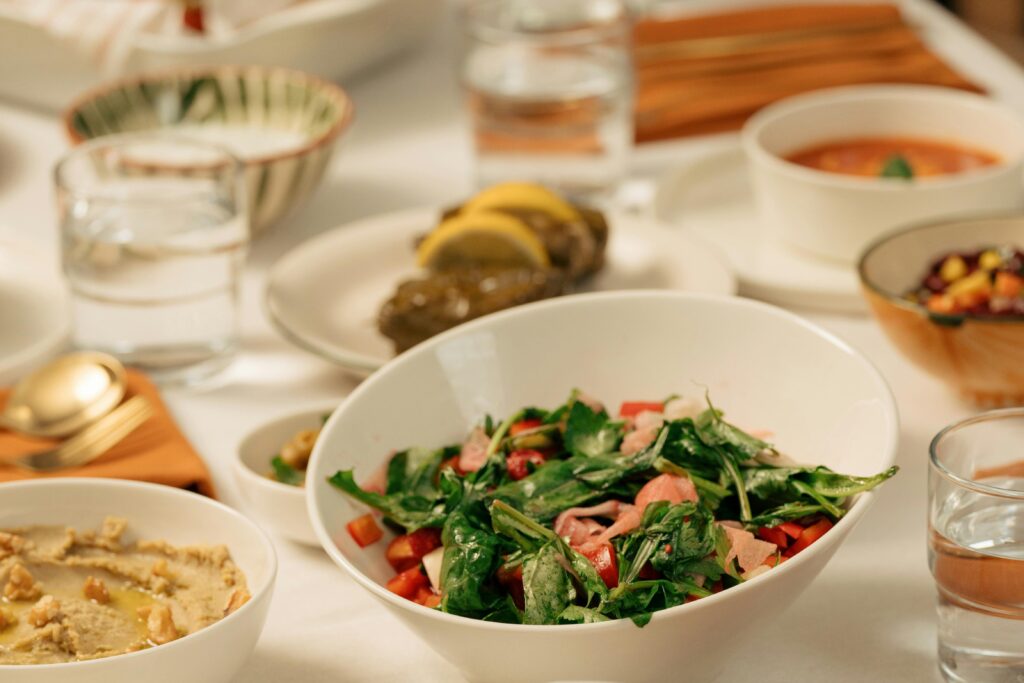
03.24.25
10 Healthy Iftar Dishes for Ramadan
After a long day of fasting, iftar becomes a much-anticipated moment. While it’s tempting to indulge in treats as a reward, eating healthy iftar dishes can be just as rewarding, if not more so.
A healthy iftar can help maintain energy levels, prevent sluggishness, and keep digestion smooth throughout Ramadan.
For iftar is the meal that one eats to mark the end of their fasting. The meal that nourishes the body and helps you regain energy. So, we should make the most of it!
Healthy Iftar Dishes to Try This Ramadan
A well-balanced iftar should include hydrating foods, complex carbohydrates, lean proteins, and healthy fats to replenish nutrients lost during the day.

Whether you’re looking for light meals, protein-packed options, or nutritious alternatives to traditional favourites, here are 10 healthy iftar dishes to enjoy this Ramadan.
1. Lentil Soup (Shorbat Adas)
Lentil soup is a staple in many Muslim households during Ramadan. It’s warm, nourishing, and easy to digest after a long fast. Packed with fibre, protein, and essential vitamins, this soup helps restore energy while keeping you full.
To make it even healthier, use olive oil instead of butter, add carrots and spinach for extra nutrients, and serve it with whole-grain bread instead of white flour rolls.
2. Grilled Chicken with Quinoa Salad
For a protein-rich meal that keeps you feeling energised, try grilled chicken with quinoa salad. Chicken provides lean protein, while quinoa is a fibre-rich grain that helps stabilise blood sugar levels.
Marinate the chicken in olive oil, lemon, and garlic for flavour without unhealthy fats. Pair it with a salad made of quinoa, cucumbers, cherry tomatoes, parsley, and a squeeze of lemon juice for a refreshing and nutrient-packed dish.
3. Baked Sweet Potato and Chickpea Patties
If you’re craving something crispy but want to avoid deep-fried foods, these baked sweet potato and chickpea patties are a perfect choice. They provide complex carbohydrates, protein, and fibre without the heavy oils of traditional fried snacks.
Mash sweet potatoes with cooked chickpeas, season with cumin, coriander, and garlic, and bake them until golden brown. Serve with Greek yogurt dip for added protein and probiotics.
4. Date and Nut Energy Balls
Dates are a natural source of quick energy, making them an excellent way to break your fast. Instead of eating plain dates, try making date and nut energy balls for a healthy and satisfying snack.
Blend dates, almonds, walnuts, and a pinch of cinnamon in a food processor, then roll into bite-sized balls. These are naturally sweet, packed with healthy fats and fibre, and provide a sustained energy boost.
5. Hummus with Whole Wheat Pita and Vegetables
Hummus is a protein-rich dip made from chickpeas, tahini, lemon juice, and garlic. It’s full of fibre, plant-based protein, and healthy fats, making it an excellent choice for iftar.
Instead of pairing it with white bread, serve hummus with whole wheat pita, cucumber sticks, and carrot slices for a nutritious and balanced snack. The added fibre helps with digestion and prevents blood sugar spikes.

6. Stuffed Bell Peppers with Brown Rice and Lentils
Stuffed bell peppers are a colourful, nutrient-dense meal packed with vitamins and minerals. Using brown rice and lentils as a filling provides complex carbohydrates and plant-based protein, helping to keep energy levels steady.
To prepare, sauté onions, garlic, and spices, mix with cooked rice and lentils, stuff the mixture into bell peppers, and bake until tender. This dish is filling, fibre-rich, and packed with antioxidants.
7. Grilled Salmon with Steamed Vegetables
For a meal that’s high in omega-3 fatty acids and lean protein, grilled salmon is a great choice. Omega-3s help reduce inflammation and support brain and heart health, which is essential during fasting.
Serve the salmon with steamed broccoli, carrots, and zucchini, and drizzle with lemon juice and olive oil for extra flavour and nutrients. This meal is light yet satisfying, perfect for maintaining energy levels.
8. Watermelon and Feta Cheese Salad
Staying hydrated is crucial during Ramadan, and watermelon is one of the best hydrating fruits to include in your iftar. This simple salad combines sweet watermelon with salty feta cheese, fresh mint, and a drizzle of balsamic glaze for a refreshing and nutritious dish.
The high water content in watermelon helps with rehydration, while feta cheese provides protein and calcium. It’s a perfect light dish to serve alongside a main meal.
9. Oven-Baked Samosas with Spinach and Feta
Samosas are a Ramadan favourite, but traditional deep-fried versions can be heavy and greasy. A healthier alternative is oven-baked samosas stuffed with spinach, feta cheese, and spices.
Using whole wheat dough instead of white flour makes them more fibre-rich while baking instead of frying reduces excess oil and calories. These samosas are crispy, flavourful, and packed with nutrients.
10. Chia Seed Pudding with Almond Milk and Berries
For a nutritious and naturally sweet dessert, try chia seed pudding. Chia seeds are rich in omega-3s, fibre, and protein, making them a great option for iftar.
Soak chia seeds in almond milk overnight, then top with fresh strawberries, blueberries, and a drizzle of honey. This pudding is light, hydrating, and full of antioxidants, making it a great way to end your iftar.
Eating Healthy Iftar Meals in Ramadan is Easier Than You Think!
Choosing healthy meals for iftar makes a huge difference in energy levels, digestion, and overall well-being. By incorporating delicious and nutrient-rich foods in your iftar meals, you can stay on top this Ramadan feeling healthy and energised.
Try adding one or more of these 10 healthy iftar recipes to your meal plan this Ramadan! May Allah (SWT) accept your efforts and keep you steadfast!

